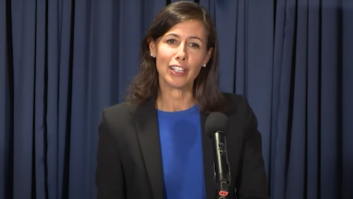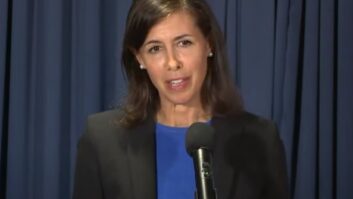Focus on enforcement
Dec 1, 2000 12:00 PM, Harry Martin
The Chief of the FCC Enforcement Bureau recently reminded all licensees that a renewed rule-enforcement effort at has been undertaken in the last 12 months and that the FCC fully intends to continue the aggressive effort. The FCC conducted a bureaucratic shuffle last year that increased the agency’s investment in enforcement. In his recent speech, the Chief of the new Enforcement Bureau restated that violators will be subject to “serious” consequences and that enforcement will be speedy.
The Mass Media Bureau Chief admonished licensees who, in the context of an investigation, adopt the tactic of providing incomplete or indirect responses to FCC agents. The Chief advised all stations to respond in a clear and straightforward manner. The FCC has stated clearly that failure to fully cooperate may have more serious consequences than the rule violations themselves.
Main studio rule reprieve. The FCC Commissioners overturned a fine by the Enforcement Bureau under the main studio rule. In January the Bureau assessed a $7,000 fine against an AM station for failing to have sufficient staff at its studios during normal business hours. The AM station asked the Enforcement Bureau to reconsider its decision, in part because the station was relying upon a checklist it had downloaded from the FCC. The checklist did not mention the main studio staffing standard. The Bureau refused to reconsider its decision and stood by its fine. The station appealed directly to the FCC Commissioners who, in a brief order, noted that the station made a good faith effort, overturned the Bureau’s decision, and canceled the fine.
FCC “Knows It When It Hears It.” An owner of two FM radio stations was fined $14,000 ($7,000 per station) for indecent broadcasts. In the first incident, the station aired a joke which contained no curse words and no description of any excretory or sexual activity, but relied upon innuendo which required the listener to infer what was happening. The FCC stated that innuendo alone may be patently offensive and fined the station because the punch line of the joke inescapably referred to sex. In the other case, a listener wrote to the FCC and, without a tape recording or transcript of the aired segment, described what the listener remembered from the on-air exchange. The on-air exchange involved a certified clinical therapist who described certain sexual activities in clinical terms. However, the FCC noted that the on-air personalities were supplying additional commentary and noises which turned the segment from a clinical discussion into an indecent broadcast.
LPFM reconsideration order In September the FCC issued an order which dealt with the petitions for reconsideration filed against its new LPFM rules. In its order, the FCC refused to require LPFM stations to provide third-adjacent channel interference protection to full-power stations, and adopted new procedures for handling interference complaints.
The new complaint procedures apply when a full-service station receives complaints of new interference from one percent of listeners in the area most likely to receive interference. Any such interference complaints that cannot be worked out between the LPFM and full-power stations would go into an FCC proceeding to be resolved within 90 days.
Although some broadcasters commended the Commission for adding the interference complaint procedures, others are concerned that the procedures will be slow and ineffective. Other broadcasters complained that the reconsideration order fails to protect public radio translators. The order specifically rejected a request from National Public Radio to allow translators that interfered with the right to have LPFM stations taken off the air.
The reconsideration order also (1) provides an exception to the third-adjacent channel interference rule when necessary to protect radio reading services for the blind, (2) does not modify LPFM power levels, (3) will not alter requirements for noncommercial operations, and (4) refuses to modify the Commission’s previous decision denying LPFM licenses to unrepentant pirates. Further, the order revises the Commission’s ownership rules to (1) allow one party to own multiple LPFM stations where there are no competing applications, (2) allow public transportation agencies and others to operate a string of LPFM stations, and (3) allow universities with multiple campuses and school districts with multiple high schools to have multiple licenses.












